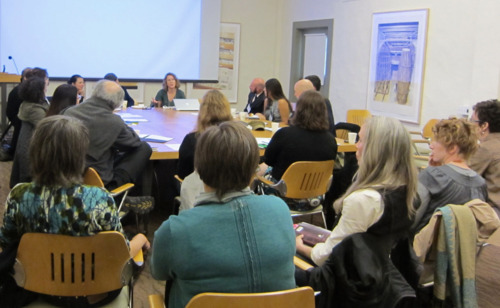
It is hard to believe that it has been a week since the Curating People conference. Like most participants, I left our day of reflection to return to the mayhem of this week’s obligations, and it has been hard to come up for air.
Since I am writing during a moment that can only be described as “stolen,” I will not try to summarize the pages and pages of notes that I took during all of the thoughtful and energetic sessions. Instead, I will very quickly put out some clustered thinking around ideas and hopes that I heard expressed in the room. I would welcome any feedback, responses, revisions, or expansions on any of the below. So in no particular order, not in complete sentences, no footnotes (hard for an academic), let me offer the following:
1) How to un-silo communities of arts and culture: Milk Bar-like occasions for artists to casually and convivially curate work for each other. Artpractical and ARC “Picks” that run the gamut of arts programming. Co-taught courses that require students, artists, and faculty to engage more deeply, less superficially in the skills and histories of other forms. Sustain a national and international network of artists and organizers addressing similar issues and silos in their regions of the world. Can international programming from abroad in fact facilitate cross-arts engagement, especially when a shared area studies focus provides the context for connection?
2) Economies that support hybrid art work: individual philanthropy? state and federal funding? arts foundation funding? funding from non-artistic sectors? revenue from tickets? from rentals? from selling beer? How does mixed-media address, dodge, and deploy this mixed economy? Amid the distress about a “financial crisis” that makes it hard to argue for the arts, what opportunities do we have to join other discourses that are trying to remind us of values other than the economic?
3) More writers and writing venues: As art organizers and curators lamented the absence of “the press” in contextualizing their work, we ended up confronting the state of criticism as a profession and in the age of the blogosphere. In particular, some noted that the dearth of writers able to address the broad landscape of performance and relational art. We also noted that the act of critical writing is less often integrated into the job description of the performance producer than it is in the job description of the visual arts curator. While I share frustration around these issues, my hope is that academic institutions have a role to play here, both as a venue for educating art writers and in general as a venue that is supposed to be devoted to sustaining public dialogue.
4) Future research: Some of us might be specifically interested in plotting collaborative research projects from here forward. 1) Bay Area Arts Ecologies: While there has been wonderful work on artists, groups, and movements, it seems that there is much more historicization of experimental arts in the Bay Area’s recent past. Some have begun interviews, archives, documentation, and new critical writing on this topic. How can we mobilize extant efforts and begin new ones that plot this diverse history? 2) Cross-Arts Curating Handbooks/Collections: I wondered about a sustained effort to gather interviews, transcribed roundtables, strategic conversations between artists and their curators/producers. Would such real-world stories that are both conceptual and pragmatic be of service to arts administrators, artists, curators, students, funders?
5) Future spaces for reflection: Participants talked about not having time in the midst of their work to reflect on its significance or to think about broader pictures. Do we need an arts administrators’ retreat? a curators’ colony? experiences akin to those Minh-ha described to some of us, where people are gathered from multiple sectors to experience and make art in an unusual space? More immediately, we at ARC want to continue to create more spaces of reflection that produce helpful conversations and new work for all involved. We are thinking that the next one will be more squarely focused on Curating the Social, with all that means for arts education, social practice, community engagement, and audience interaction. Any input on what you would like to see from what such a gathering? or ideas about what kinds of ongoing gatherings we should join rather than try to reinvent ourselves?
No comments:
Post a Comment